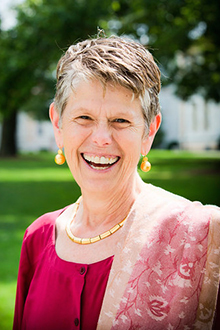
Bobbi Patterson has long studied how to reframe breakdowns and burnouts as opportunities, leading to her new book, “Building Resilience.” With changes brought on by the COVID-19 pandemic and her own retirement, she’s practicing her own advice.
Retiring amid the shifting anxieties of a pandemic would wreak havoc on most people. Bobbi Patterson is not most people.
Patterson officially retires at the end of August as a professor of pedagogy in Emory College’s Department of Religion. Her recently published book “Building Resilience Through Contemplative Practice” reflects her career of creating an intellectual environment that learns by doing.
By reframing breakdowns and burnouts as opportunities to build resilience, each chapter offers hands-on tools and skills for moving into disruptions and rebuilding next steps. The book is a handbook of strategies for working with collapsed plans, including aspects of today’s demands due to the global COVID-19 pandemic.
“Just as I began to explain how too much stability weakens your ability to adapt, hello COVID,” Patterson says. “The real question is how to develop capacities for engaging inevitable collapses. It requires reflection, the fundamentals of contemplative practices, which resist denial without blaming and give your body, heart and mind pause to settle and be with what is changing. That stability helps you discover alternate paths for thriving – and likely innovation.”
Such a seemingly simple solution stems from Patterson’s decades of engaged ministry, religion and ecology teaching, and research into comparative spiritual practices.
As one of 23 members of Emory College faculty retiring this year, she is among a stellar cohort of scholars and teachers who helped usher Emory University to its perch as a world-renowned research institution.
Patterson focused on urban ministries at Harvard Divinity School, then worked in inner-city settings for about five years. She applied the traditional Protestant ethic to her efforts: good people power through; bad people burn out.
Even then, she sensed that prevailing approach was wrong.
She joined Emory as the associate university chaplain in 1981, developing community-partnered learning and service initiatives. She also served as dean of students and director of the Emory Scholars Program, founded the Theory-Practice Learning Program and served on the task force that created the Emory Center for Women.
Patterson earned her PhD in interdisciplinary studies from Emory in 1994, the same year she joined the faculty. Her research and teaching with Lance Gunderson, professor and chair of the Department of Environmental Sciences, led her to adaptive resilience theory, which explains a natural cycle of social-ecological systems.
She realized that breakdown — when viewed through the cycle’s phases of stability, collapse, reorganization and rebuilding — was not failure. It was a necessary phase of healthy life systems.
It takes time, and practice, to develop that insight. Ample research supports the idea that mindfulness and meditation, the very sorts of workshops Patterson has long led, help develop that ability to objectively acknowledge your thoughts and feelings.
Her book links these contemplative approaches to pragmatic exercises — like learning how to pause and regroup, for instance, and how to take a self-inventory of preferred tasks — to build a way forward. Resilience weaves through each stage.
“It is quintessential Bobbi, as the capstone of her career, to translate her work as a scholar of faith into a source of strength for the community,” says Allison Adams, associate director for research and scholarship for the Center for Faculty Development and Excellence, whose Scholarly Writing and Publishing Fund helped bring the book to publication by connecting Patterson with an editor.
The pandemic has forced Patterson to cancel in-person community events to discuss her work, but, taking a page from her literal book, she is undeterred. She continues to give online talks and workshops.
Her publisher, Routledge, shared a chapter of her book online as part of its free resource contribution to Self-Care for Mental Health Professionals during Mental Health Month in May.
Her work also attracted the interest of the Mind & Life Institute, a nonprofit in Virginia working to build a scientific understanding of the mind. Patterson now sits on the group’s steering council.
She is also part of a new resilience/sustainability initiative at Emory aligned with Emory’s Office of Sustainability Initiatives.
“I’ve been very lucky,” Patterson says. “Change is the sweet spot. It sounds so simple, but it is real work to embrace that.”
